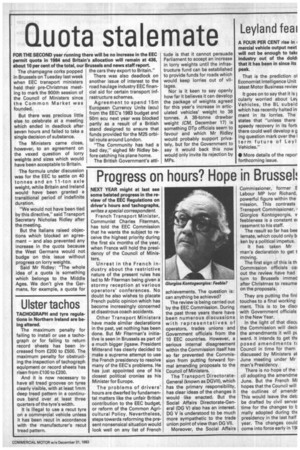Progress on hours? Hope in Brussel;
Page 7

If you've noticed an error in this article please click here to report it so we can fix it.
NEXT YEAR might at last see some belated progress in the review of the EEC Regulations on driver's hours and tachographs, writes a special correspondent.
French Transport Minister, Communist Charles Fiterman, has told the EEC Commission that he wants the subject to receive the highest priority during the first six months of the year, when France will hold the presidency of the Council of Ministers.
Unrest in the French industry about the restrictive nature of the present rules has led to Mr Fiterman being given a stormy reception at various operators' conferences. No doubt he also wishes to placate French public opinion which has become increasingly concerned at disastrous coach accidents.
Other Transport Ministers have made similar declarations in the past, yet nothing has been done. But Mr Fiterman's initiative is seen in Brussels as part of a much bigger jigsaw. President Mitterand has clearly decided to make a supreme attempt to use the French presidency to resolve many of the EEC's problems. He has just appointed one of his closest political cronies as his Minister for Europe.
The problems of drivers' hours are dwarfed by fundamental matters like the unfair British contribution to the EEC budget, or reform of the Common Agricultural Policy. Nevertheless, steps towards reforming the present nonsensical situation would look well on any list of French achievements. The question is: can anything be achieved?
The review is being carried out by the EEC Commission. During the past three years there have been numerous discussions with representatives of operators, trades unions and Government officials from the 10 EEC countries. However, a serious internal disagreement within the Commission itself has so far prevented the Commission from putting forward formal amending proposals to the Council of Ministers.
The Transport DirectorateGeneral (known as DGVII), which has the primary responsibility, has clear ideas of the changes it would like enacted. But the Social Affairs Directorate-General (DG V) also has an interest. DG V is understood to be much more sympathetic to the trade union point of view than DG VII.
Moreover, the Social Affairs Commissioner, former E Labour MP Ivor Richard, powerful figure within the mission. This contrasts Transport Commissioner, Giorgios Kontogeorgis, v feebleness is a constant ei rassment to his staff.
The result so far has bee lemate, which could only b ken by a political impetus.
It has taken Mr man's declaration to get t moving.
The first sign of this is th Commission officials cai out the review have had turn to Brussels immed after Christmas to resume on the proposals.
They are putting the fini touches to a final working ment. This is to be disci with Government officials in the New Year.
In the light of that discu the Commission will deck the amendments it will pt. ward. It intends to get th( posed amendments tE Council in time for them discussed by Ministers at June meeting under Mr man's Presidency.
There is no hope of the cil adopting the amendme June. But the French Mi hopes that the Council will the outlines of amendr This would leave the dee be drafted by civil servar time for the changes to mally adopted during thE presidency in the last half year. The changes could come into force early in 191
































































